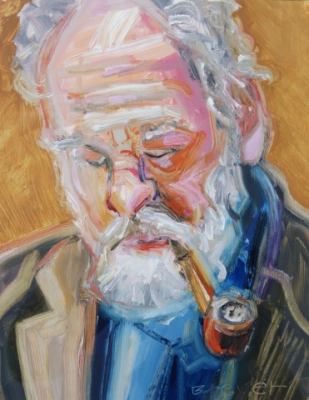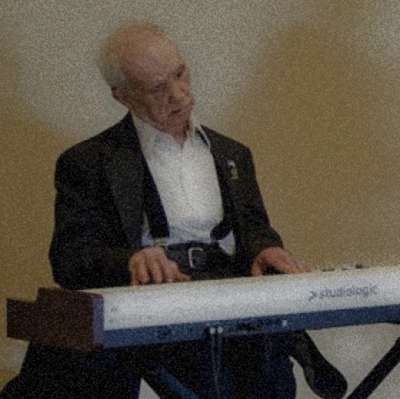.
.
“Man Smoking Pipe” by James Brewer

.
Memory Man: Living the Blues
by
Michael L. Newell
.
…..He is an old man, a tired man wearing patches and rags and shoes whose soles flap step after step, a man who carries ghosts inside him up and down the hills he trudges, alone but accompanied by hundreds of faces and voices he has known. Who, he asks himself, is that lass walking on the far side of the street; I know her, no name, no place, but I know her, the gait, the sway, the roll of hip and thigh, and the boys walking by she ignores. I see her everywhere I wander through this town, and yet I am sure we have never spoken, nor has she ever noticed my passing. She is a prototype for a dozen others, flagship for a fleet of young women eyed by many, known casually by most of their age group, known well by few, if any. They are echoes of visions in the old man’s memory.
….. My passing, he thinks again. When will that be? How long until this weary, weary stride slows to stillness, to an exhausted slipping into earth to feed future, bush, tree, and hungry plant. Others worry about burial or cremation. I don’t worry about this old rag I have become. Wherever it is planted, however it is disposed of, I will neither feel it, nor care about it.
….. Whose voice is that echoing from the church on the corner? I could swear I have known it before, often before, but I can not put to it a name, a face. I could walk into the church and see if I know the speaker, but there would be a hundred faces, and I would wish to put a name to them all. It seems, though, that I have forgotten names, forgotten what places to associate with faces. All faces are familiar, no names mean a thing, and all sources of meaning float on the wind like vagrant clouds or lost raindrops.
….. The old man slips through streets and lives of passing strangers like a discarded wrapper floating on a breeze down a suburban side street, rising and falling, settling to earth, lifting off again, a final resting place nowhere in sight, and a source of laughter to children and teenagers in search of entertainment.
….. In the attic of his head, there is an encyclopedia of people engaged in activities he once shared. He remembers faces, bodies, activities, but names have faded. Was Paul really John, was Thomas actually Bill, did Sally and Mary have one another’s names, or wear names long forgotten? Do names matter?
….. Whoever she was, she gave him the best kiss of his life. Whoever he was, he bestowed on the old man the greatest act of kindness he ever received. Strangely, all those he once cursed have faded into smudges on the edges of his mind’s pictures; those with whom he has laughed and shared curses at Fate are clearer in his memory than today’s breakfast or his reasons for taking this walk carrying him hither and yon through this small town which is as strange to him as the couple driving past in a pickup truck shouting imprecations at the world. His past is more his present than the world through which he moves. Reaching home he collapses onto a couch and visits a dozen times and places retained in memory, that unreliable zoo whose creatures keep reforming, renaming, replacing themselves. Unreliable, true, but deeply comforting, and a haven from a world the old man understands less and less.
….. From a nearby house, some youngster tries to make his dobro sing the blues. Thinks the old man, your chops are pretty good, lad, but you’ve still got a few years to live before you can make that instrument really sing. Also, you need a mouth harp to create a fuller sound. As the old fellow hovers on sleep’s edge, he realizes he would like to hear the player in about ten years. Just before he drifts off, he laughs and murmurs, I’ll be dead in ten years. Pick up the pace, laddie. His snores fill the room.
.
___
.
Michael L. Newell lives in a small town on the Florida coast.
.
.
Listen to a 1953 recording of Duke Ellington playing his composition “Reflection in D”
.
.
.











































A nice one, Michael. I have read pieces of it in many of your poems it seems. Pick up the pace, indeed. But not too fast or it all slips by –
“Also, you need a mouth harp to create a fuller sound. As the old fellow hovers on sleep’s edge” I’d love to be that mouth harp playing the voice of that fuller sound my friend! This is a beautiful piece Sir Newell>
A very good look into memory, and how memories are remembered. “his past is more
his present …” Really nailed it down. It is strange at 73 how you remember things
clear back in your 20’s. Very good story.